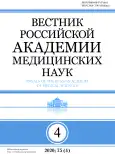Cancer treatment and research in the context of COVID-19 pandemic: the experience of foreign countries
- Authors: Kit O.I.1, Gevorkyan Y.A.1, Soldatkina N.V.1, Gevorkyan E.Y.2
-
Affiliations:
- National Medical Research Centre for Oncology
- I.M. Sechenov First Moscow State Medical University (Sechenov University)
- Issue: Vol 75, No 4 (2020)
- Pages: 278-282
- Section: ONCOLOGY: CURRENT ISSUES
- URL: https://ogarev-online.ru/vramn/article/view/125687
- DOI: https://doi.org/10.15690/vramn1384
- ID: 125687
Cite item
Full Text
Abstract
The coronavirus disease 2019 (COVID-19) has rapidly swept the world. Patients with cancer could be at particular risk of COVID-19, since they are often immunosuppressed by their therapy. Assessing the risk-benefit ratio of potentially immunosuppressive treatment for patients with cancer with insufficient knowledge of this new disease and balancing individual and community benefits poses acute ethical dilemmas for oncologists. Researchers provided the first guidelines for cancer patients treatment. Individual treatment plans should be adjusted to minimise routine visits, procedures and tests. Patients should be categorised into different priorities for receiving active cancer therapy during the pandemic. Oncologists should consider changing intravenous treatments to subcutaneous or oral routes, as well as suspending radiation therapy or using hypofractionation. In case of developing COVID-19 patients with cancer should be treated in the respiratory or intensive care units rather than in the oncology units. Preventive measures and emergency plans to help patients should also be developed. The COVID-19 pandemic has had a devastating impact on clinical research in haematology and oncology. A dramatic reduction in the number of participants in current research and delays in planned haematology and oncology research, as well as adverse financial consequences and potential delays in the delivery of promising drugs to patients should be expected. Regulatory agencies provided guidelines on managing clinical trials during the COVID-19 pandemic, emphasising the importance of pragmatism and flexibility in routine visits, procedures and tumour assessments and clearly documenting protocol deviations. Ensuring patients’ safety during the pandemic is of primary priority. Every trial participant should be contacted before the planned visit to ensure they don’t have any COVID-19 symptoms. Laboratory and radiological assessments should be done at the closest to patient medical facility, and some investigational products, such as oral medications, should be delivered directly to patient to avoid hospital visits. The COVID-19 pandemic has had a serious negative impact on both treatment of cancer patients and research in this area. The support of all stakeholders is the only thing that can help ensure the best possible care for patients at this difficult time.
Keywords
Full Text
##article.viewOnOriginalSite##About the authors
Oleg I. Kit
National Medical Research Centre for Oncology
Email: rnioi@list.ru
ORCID iD: 0000-0003-3061-6108
SPIN-code: 1728-0329
Professor, Corresponding Member of the RAS
Russian Federation, 63, 14-line street, Rostov-on-Don, 344037Yurii A. Gevorkyan
National Medical Research Centre for Oncology
Email: gevorkyan.000@mail.ru
ORCID iD: 0000-0003-1957-7363
SPIN-code: 8643-2348
MD, Professor
Russian Federation, 63, 14-line street, Rostov-on-Don, 344037Natalya V. Soldatkina
National Medical Research Centre for Oncology
Author for correspondence.
Email: snv-rnioi@yandex.ru
ORCID iD: 0000-0002-0118-4935
SPIN-code: 8392-6679
MD, PhD, Leading Research Associate
Russian Federation, 63, 14-line street, Rostov-on-Don, 344037Elvina Y. Gevorkyan
I.M. Sechenov First Moscow State Medical University (Sechenov University)
Email: elvina.gev@gmail.com
ORCID iD: 0000-0003-1594-1746
SPIN-code: 9968-1260
Student
Russian Federation, 8-2, Trubetskaya street, Moscow, 119992References
- Zhang L, Zhu F, Xie L, et al. Clinical characteristics of COVID-19-infected cancer patients: a retrospective case study in three hospitals within Wuhan, China. Ann Oncol 2020. Published online March 26. doi: https://doi.org/10.1016/j.annonc.2020.03.296.
- You B, Ravaud A, Canivet A, et al. The official French guidelines to protect patients with cancer against SARS-CoV-2 infection. Lancet Oncol. 2020. Published online March 25. doi: https://doi.org/10.1016/S1470-2045(20)30204-7.
- Onder G, Rezza G, Brusaferro S. Case-fatality rate and characteristics of patients dying in relation to COVID-19 in Italy. JAMA. 2020. Published online March 23. doi: https://doi.org/10.1001/jama.2020.4683.
- Eichenberger EM, Soave R, Zappetti D, et al. Incidence, significance, and persistence of human coronavirus infection in hematopoietic stem cell transplant recipients. Bone Marrow Transplant. 2019;54(7):1058–1066. doi: https://doi.org/10.1038/s41409-018-0386-z
- Saini KS, de las Heras В, de Castro J, Venkitaraman R, Poelman М, Srinivasan G, Lamba Saini M, Verma S, Leone M, Aftimos Ph, Curigliano G. Effect of the COVID-19 pandemic on cancer treatment and research. doi: https://doi.org/10.1016/S2352-3026(20)30123-X.
- National Health Service England. Clinical guide for the management of noncoronavirus patients requiring acute treatment: cancer. March 23, 2020. Available from: https://www.england.nhs.uk/coronavirus/wp-content/uploads/sites/52/2020/03/specialty-guide-acute-treatment-cancer-23- march-2020.pdf (accessed: 01.04.2020).
- Каприн А.Д., Гамеева Е.В., Поляков А.А., Корниецкая А.Л., Рубцова Н.А., Феденко А.А. Влияние пандемии COVID-19 на онкологическую практику. Сибирский онкологический журнал. — 2020. — Т. 19. — № 3. — С. 5–22. [Kaprin AD, Gameeva EV, Polyakov AA, Kornietskaya AL, Rubtsova NA, Fedenko AA. Impact of the COVID-19 Pandemic on the oncological practice. Siberian Journal of Oncology. 2020;19(3):5–22. (In Russ.)]. doi: https://doi.org/10.21294/1814-4861-2020-19-3-5-22.
- Sud A, Jones ME, Broggio J, Loveday C, Torr B, Garrett A, Nicol DL, Jhanji S, Boyce SA, Gronthoud F, Ward P, Handy JM, Yousaf N, Larkin J, Suh Y-E, Scott S, Pharoah PDP, Swanton C, Abbosh C, Williams M, Lyratzopoulos G, Houlston R, Turnbull C. Collateral damage: the impact on outcomes from cancer surgery of the COVID-19 pandemic. doi: https://doi.org/10.1016/j.annonc.2020.05.009.
- Ginsburg KB, Curtis GL, Timar RE, George AK, Cher ML. Delayed Radical Prostatectomy is Not Associated with Adverse Oncologic Outcomes: Implications for Men Experiencing Surgical Delay Due to the COVID-19 Pandemic. doi: https://doi.org/10.1097/JU.0000000000001089.
- ASCO Coronavirus Resources. Available from: www.asco.org/asco-coronavirus-information/care-individuals-cancer-during-covid-19.
- National Cancer Institute. Guidance for collection of adverse events related to COVID-19 infection. March 25, 2020. Available from: https://ctep.cancer.gov/content/ docs/Adverse_Event_Guidance_COVID-19_Final_3-25-20.pdf (accessed: 06.04.2020).
- Mehta P, McAuley DF, Brown M, et al. COVID-19: consider cytokine storm syndromes and immunosuppression. Lancet. 2020;395:1033–1034. doi: https://doi.org/10.1016/s0140-6736(20)30628-0.
- European Medicines Agency. Guidance to sponsors on how to manage clinical trials during the COVID-19 pandemic. March 20, 2020. Available from: https://www.ema.europa.eu/en/documents/press-release/guidance-sponsors-how-manage-clinical-trials-during-covid-19-pandemic_en.pdf (accessed: 01.04.2020).
- US FDA. FDA guidance on conduct of clinical trials of medical products during COVID-19 pandemic. March 2020. Available from: https://www.fda.gov/ media/136238/download (accessed: 01.04.2020).
- Medicines and Healthcare products Regulatory Agency. Managing clinical trials during Coronavirus (COVID-19). March 19, 2020. Available from: https://www.gov.uk/guidance/managing-clinical-trials-during-coronavirus-covid-19 (accessed: 01.04.2020).
Supplementary files






